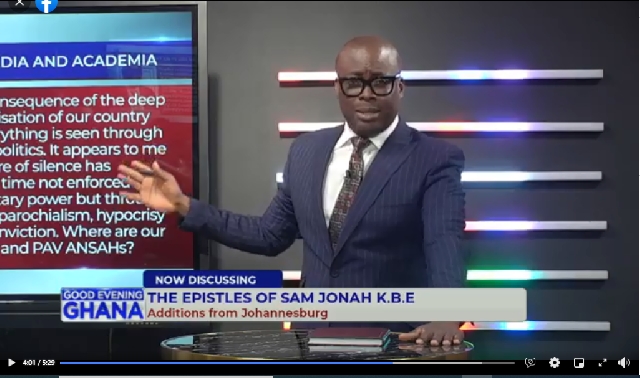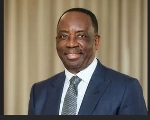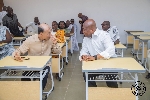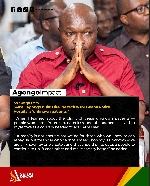Where’s the culture of silence? Adom-Otchere asks Sam Jonah
 Paul Adom-Otchere
Paul Adom-Otchere
Good Evening Ghana host Paul Adom-Otchere has rubbished Sir Sam Jonah’s claim that the culture of silence has resurfaced.
“It’s not correct, it’s not true”, he said in an editorial on his show on Tuesday, 27 April 2021.
In a recent speech to Rotarians in Accra titled ‘Down the up escalator – Reflections on Ghana’s future by a senior citizen’, the executive chairman of Jonah Capital, an equity fund based in Johannesburg, South Africa, said: “In the past, when all had failed, academia was the last vanguard”.
“We all remember the role that the Legon Observer played”, he said, adding: “Under the hallowed cloak of academic freedom, men and women of conscience could write and speak words that penetrated the halls of power”.
However, he noted: “It appears to me that in recent times in our fourth Republican dispensation, the courage to stand up for the truth and the determination to uphold the common good are lost. In our dark moments as a nation, it is concerning that the voices of the intellectuals are receding into oblivion”.
“Sadly, it is a consequence of the deep partisan polarisation of our country such that everything is seen through the lenses of politics”, noting: “It appears to me that the culture of silence has returned. This time, not enforced by legal and military power but through convenience, parochialism, hypocrisy and lack of conviction”.
“Where are our Adu Boahens and PAV ANSAHs?” he asked.
However, Mr Adom-Otchere said: “The culture of silence, I don’t agree with, there’s no culture of silence”, adding: “There’s a culture of silence but he’s speaking, other people are writing and these days, social media has become very brutal, Twitter is brutal”.
“You can’t call that a culture of silence”, he insisted.
“With the greatest of respect”, he said: “You cannot call what is happening in Ghana today a culture of silence”.
“Who is not able to speak?” he asked, citing as an example: “Even when the president was concerned about a documentary that had been created to indicate that he was in support of some violence, what did the president do? He sued at the National Media Commission where nobody gets punished, nobody goes to prison, nothing happens to anybody; people are just asked to apologise”.
He stressed: “The president of the republic, the commander-in-chief of the armed forces, was concerned about a publication, he sued at the National Communication Authority. Is that a culture of silence where he’ll file a writ at the National Media Commission and complain that this journalists has done this story against me, ‘NMC, take a look it’? That is not the atmosphere of culture of silence”.
So, Mr Adom-Otchere noted, “I’m not so sure of the culture of silence”.
“So, I wasn’t surprised when I saw a headline, I didn’t quite read it, I saw a headline where [former President] Kufuor was asking Sam Jonah about where the culture of silence was”.
“There’s absolutely no culture of silence”’, Mr Adom-Otchere emphasised ad nauseum, noting: “He [Sam Jonah] says it is creeping back, he actually says it has returned and here we disagree with him, there’s no culture of silence”.
“Go to Twitter and see if there’s a culture of silence. Pick up a newspaper tomorrow and see if there’s a culture of silence. Listen to the radio in the afternoon. These days, they’ve developed these political afternoon shows – all of them start from 2 o’clock – listen to them and see if there’s a culture of silence”, he challenged.
He said a culture of silence is nothing to be spoken about lightly.
“Where’s the culture of silence? Culture of silence is a brutal situation; one that you grant an interview in ‘House B’ and ran away to ‘House A’ because as soon as the interview is published, there’s a problem. That’s culture of silence. There’s absolutely no culture of silence. There’s no culture of silence since the days of Adu Boahen. Ghana has been progressing steadily in a constitutional development and everybody can speak”, he repeated.
In his view, “if there’s concern about the number of voices speaking for Person A and Person B, you can say that but to say there’s a culture of silence in Ghana is absolutely wrong”.
Source: ClassFMonline.com
Trending News

KGL records major milestones in 2025, defies critics with strong national and global impact
17:16
Okudzeto-Ablakwa inaugurates smart classrooms to boost STEM education in North Tongu
11:38
CDM accuses GoldBod CEO of contradictions over Gold-for-Reserves losses
16:40
Activist Felicity Nelson brings Christmas comfort to Accra Police cells
08:32
CDM rejects claims that BoG losses were due to Gold Purchase Programme
16:35
First batch of large-scale mining licences to face possible revocation revealed
09:08
CDM calls on President Mahama to act over ‘alarming’ GoldBod trading losses
16:30
A/R: Kumawu MP celebrates Christmas with drivers and Okada riders
07:57
Alhaji Agongo builds lifeline facility for Ghana Police Hospital’s ‘unknown patients’
13:42
IGP Special Operations Team arrests suspect in Kpalsi over suspected Indian Hemp
07:48



